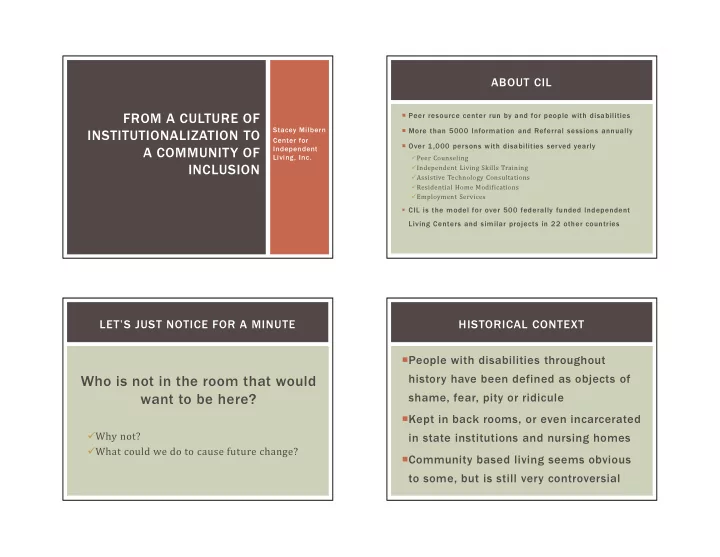

ABOUT CIL � Peer resource center run by and for people with disabilities FROM A CULTURE OF Stacey Milbern � More than 5000 Information and Referral sessions annually INSTITUTIONALIZATION TO Center for � Over 1,000 persons with disabilities served yearly Independent A COMMUNITY OF Living, Inc. � Peer Counseling � Independent Living Skills Training INCLUSION � Assistive Technology Consultations � Residential Home Modifications � Employment Services � CIL is the model for over 500 federally funded Independent Living Centers and similar projects in 22 other countries LET’S JUST NOTICE FOR A MINUTE HISTORICAL CONTEXT � People with disabilities throughout history have been defined as objects of Who is not in the room that would shame, fear, pity or ridicule want to be here? � Kept in back rooms, or even incarcerated � Why not? in state institutions and nursing homes � What could we do to cause future change? � Community based living seems obvious to some, but is still very controversial
“WE DON’T WANT MORE LIKE YOU” ACROSS SECTORS � Forced legal sterilization of disabled people � As recent as 1979 � Entrenched in fear of the unknown � Its roots crossed almost every sector BURDEN “WE CAN’T HANDLE YOU HERE” � Students with disabilities often leave their communities to go to segregated schools � Argument for Institutionalization is that the need of the individual cannot be met in a particular environment � Value Question: What actually needs to be a specialized service? What can be a mainstream service?
“WE DO NOT WANT TO SEE YOU” “WE DO NOT WANT TO SEE YOU” Minneapolis City Code � Some laws prohibited people with certain Est. 1877 disabilities from appearing in public “Persons who had “no visible means of support”, � Started in San Francisco in 1867; many not who live “idly without lawful employment”, and who repealed until 1970s could not give a judge a good account of themselves could be fined or required to spend 90 days in the � Designed to reduce “beggar population”, workhouse.” had devastating effect http://www.accesspress.org/ UGLY LAW ORDINANCE AMERICANS WITH DISABILITIES ACT Chicago City Code � Bipartisan Est. 1881 “Hidden Army” advocated for ADA “No person who is diseased, maimed, mutilated or in any way deformed so as to be an unsightly or disgusting object or improper person to be allowed in “Let the shameful walls of or on the public ways or other public places in this exclusion finally come city, or shall therein or thereon expose himself to tumbling down.” public view, under a penalty of not less than one dollar nor more than fifty dollars for each offense.” – President Bush , at signing http://www.accesspress.org/
AMERICANS WITH DISABILITIES ACT OLMSTEAD DECISION � Affords rights to people � Two institutionalized with disabilities in women with developmental employment, commerce, disabilities wanted to communication, receive services in the transportation and other community areas � Upheld ADA � Requires commerce and � Requires services to public places to be be provided in the least restrictive accessible environment possible SOCIAL MODEL OF DISABILITY PROGRESS MADE, STILL WORK TO DO � Recent changes around � The problem is not with the individual and their federal workers with impairment, but an inaccessible, inflexible disabilities, can still do environment more advocacy � Foundation of Disability Rights Movement (e.g. sheltered workshops) � Medical care for people with developmental disabilities � How do we resolve issues around time it takes to serve us, and time that is billable?
PROGRESS MADE, STILL WORK TO DO PROGRESS MADE, STILL WORK TO DO � Many continue to be � Independent Living Skills institutionalized and transition-oriented unnecessarily training � Money Follows the � Blogs and modernization Person Demonstration of resources for parents and people with project disabilities � How can we make the transition to a The more a community is community-based exposed to differences, setting more than a the less fear there is around it. geography change? CONTACT US Stacey Milbern Program Manager Center for Independent Living (510) 841-4776 ext 3162 smilbern@cilberkeley.org Donations make the work we do possible. Please consider supporting us. ☺
Recommend
More recommend